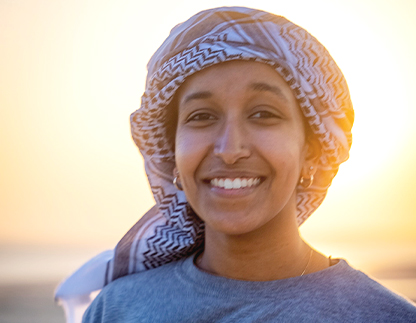One of the most rewarding things about my research is that it has really given me the ability to make better sense of myself and my community.”
Eden Melles
PhD Candidate in the Department of Political Science

Eden Melles is a PhD candidate in the Department of Political Science in the Weinberg College of Arts and Sciences. She is deeply engaged in exploring the dynamics of race, ethnicity, and identity, with a specific focus on Black immigrants and diaspora, social movements, and political behavior. Eden has been honored as a National Science Foundation Graduate Research Program Fellow and an American Political Science Association Diversity Fellow. Her research aims to illuminate the complexities of cultural and political integration processes, shedding light on the nuanced ways in which Black diasporic communities influence and are influenced by political landscapes.
How would you describe your research and/or work to a non-academic audience?
In the most broad sense, I study heterogeneity in Black politics. That is to say, I explore how different identities Black people hold—whether it be ethnic, religious, etc.—influences how they understand themselves, their group, and how it motivates them politically.
More specifically, my dissertation project will explore in depth how immigrants from Eritrea, and potentially the broader Horn of Africa region, 1.) understand their identity in a new political and social context, 2.) navigate a new political system and explore mechanisms for political learning and mobilization, and 3.) how they navigate their commitment to the politics of their home country from abroad.
Tell us what inspired your research and/or work.
The majority of my work, and my motivation for attending graduate school, are inspired by family experiences. My family is from Eritrea and although I grew up in the United States, Eritrean politics and culture were always central in my household. My family's experiences with immigration, identity construction, and navigating the politics of our homeland in the diaspora has directly influenced my research.
What do you find both rewarding and challenging about your research and/or work?
One of the most rewarding things about my research is that it has really given me the ability to make better sense of myself and my community. As an Eritrean in the US, I often feel invisible. A lot of people have no idea where Eritrea is or anything about its history. Being a graduate student has given me access to time and resources to be able to center my community, lift up their stories, and hopefully inform broader audiences about a place and culture that is so central to who I am. A big challenge, though, is that because my research is very personal, it can be hard to take my mind off of it.
How would your closest friends describe you?
I solicited some real responses from friends and condensed it into this paragraph:
Eden's friendship is the kind written about in books: abundant. Crucially, she is reliable and perceptive; qualities that not only make for a supportive friend, but also a striking scholar. Intellectually, her curiosities and questions complicate our relations to ourselves and each other in service of a better world. Eden is one of the most intellectually driven people I know and is deeply committed to the causes and people she cares about. She has a heart of gold.
What did you originally want to be when you grew up?
Growing up I was really obsessed with sharks and fish! I really wanted to be a marine biologist. I was so obsessed that when I was a kid, I met the first Eritrean Minister of Marine Resources and he promised me that when I came back to Eritrea, he would give me a personal tour of Massawa, one of the most beautiful port cities in the country. Unfortunately, he passed away before we could make it happen, but the Red Sea is central to Eritrea in a lot of ways, and I like to think my obsession with the ocean was another way I could feel connected to country.
What are you most proud of in your career to date?
The accomplishment I am most proud of currently is being awarded the National Science Foundation Graduate Research Fellowship. I feel honored because this prestigious award is mostly given to people in STEM, and it really served as a form of external validation about my research agenda. I was in shock that one of the premier research institutions in the US wanted to fund a project that allowed me to learn more about my community.
Publish Date: April 16, 2024
If you know a graduate student, postdoctoral scholar, graduate faculty member, staff member, or a member of our TGS alumni population who would make a great candidate for our TGS Spotlight Series, please complete this brief TGS Spotlight Series Nomination Form.